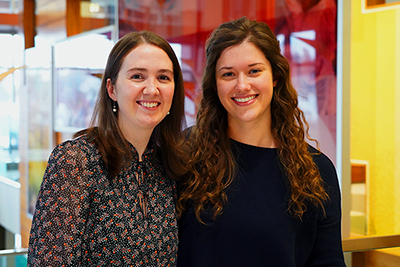Curriculum
 The Pediatric Nephrology Fellowship Program combines clinical and research training designed so that each year offers a progressive development of knowledge, skills and independence.
The Pediatric Nephrology Fellowship Program combines clinical and research training designed so that each year offers a progressive development of knowledge, skills and independence.
Year 1
Clinical
- The first year of training provides a concentrated clinical experience. During their 24 weeks on the inpatient service, fellows have the opportunity to care for patients on the Pediatric Nephrology service and perform consults followed by the service. This provides extensive experience evaluating and managing patients with acute and chronic conditions.
- First year fellows attend 5 half-day continuity clinics with a specific longitudinal faculty mentor for each session during one dedicated outpatient week each month. This includes Hypertension clinic during which fellows gain experience with interpreting 24 hr ambulatory blood pressure monitoring data. This outpatient structure has allowed for improved continuity of care. Fellows have no inpatient duties during dedicated clinic weeks. On the other hand, Fellows have no outpatient clinics during on-service weeks.
- By the end of their first year, fellows are proficient in evaluating and managing children and adolescents with kidney disease in inpatient and outpatient settings, performing percutaneous kidney biopsies, prescribing dialysis and continuous renal replacement therapies, and evaluating and managing kidney transplant patients.
Research
- During the first year of training fellows have 12 weeks of protected time to become familiar with the variety of opportunities for bench and clinical research available within the division, the department, and the medical center, to plan their fellowship scholarly activity project and identify a project mentor and the members of their Scholarship Oversight Committee (SOC) who will provide research and career guidance throughout the three years. We welcome and are supportive of proposals for non-traditional areas of scholarly activity and as a department and institution we have the infrastructure to consider well thought out projects involving advocacy, medical education, quality improvement, patient safety, and public health, for example. Have a unique idea or passion? Run it by us and if feasible we can work together to make it happen!
- During training, educational activities and department conferences, and meetings are attended to enhance the clinical and research experience. Fellows also have the opportunity to enroll in a certificate or master’s degree program.
Years 2 & 3
Clinical
- During years 2 and 3 of training, fellows are given progressive authority in clinical activities as they acquire more expertise treating patients with acute and chronic kidney conditions. Inpatient duties are reduced to 7 inpatient service weeks/year, every 4th week night call on average, and one weekend call/month to maintain and strengthen the patient management skills developed in year one.
- 2nd and 3rd year Fellows continue to follow their panel of patients with their faculty mentors during monthly 5 half-day clinics.
- Opportunities are available for elective experiences with related Pediatric and Adult services.
- Fellows gain increasing independence during training commensurate with their knowledge, skills, and experience. By the end of the 3rd year of training they are expected to run the pediatric nephrology service during a rotation with faculty available for support but providing input and direction only if absolutely needed for patient safety.
Research
- Second and third year fellows spend the majority of time developing, implementing, and preparing to disseminate their scholarly project under the guidance of their primary mentor. Fellows meet formally with their SOC at least twice a year to review their progress, solicit feedback, and identify potential funding sources and collaborations that may benefit the project.
- By the end of the third year of training, a major work project will be complete; this scholarly work product is required by the American Board of Pediatrics to sit for the subspecialty board exam. Fellows pursuing an advanced degree continue classes during the second and third year. With careful planning, their scholarly work product can serve as their master’s thesis.
- Trainees submit the outcomes of their project for presentation at national meetings and for publication in peer-reviewed journal. Third year fellows have the opportunity to present their project at Pediatric Grand Rounds.
Four Year Combined Adult and Pediatric Curriculum
For those who have completed residency training in Pediatrics and Internal Medicine the opportunity is available to pursue a combined curriculum. At the completion of this curriculum, fellows are eligible to become dual certified in both pediatric nephrology and adult nephrology.
Clinical
- The curriculum requires fellows to spend two years in pediatrics and two years in medicine, working closely with mentors in each program who will provide invaluable experiences in each area.
Research
- Fellows in this curriculum begin a research project in the first year of training and will have the opportunity to have both pediatric and adult mentorship.
- Educational activities and department conferences and meetings are attended in respective year to enhance both the clinical and research experience.
Sample Four Year Combined Curriculum Block Diagram
Adult Nephrology Fellowship Curriculum